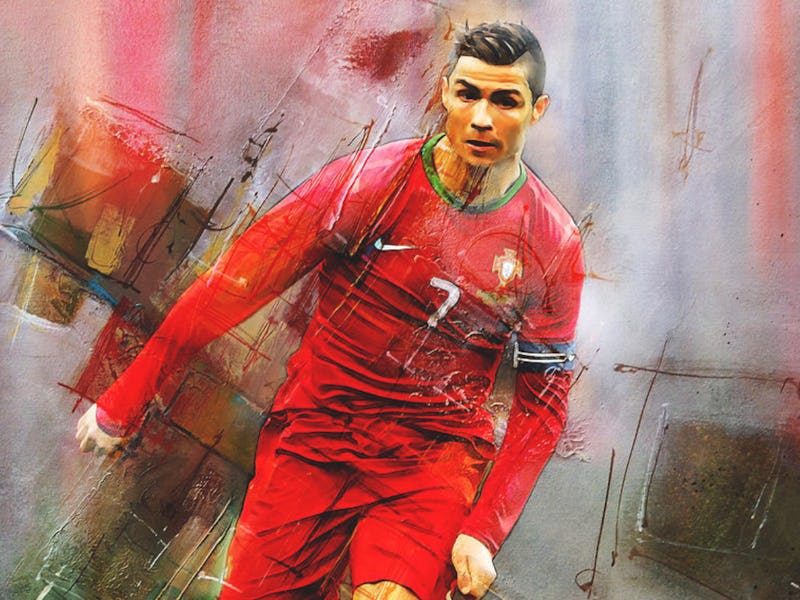Who Wins Portugal vs. Spain? A.I. Predicts the World Cup Match
Ronaldo may not start his final World Cup in the best way.

It seems hard to think about it now, but 2018 is probably the final World Cup for Cristiano Ronaldo. The Portuguese striker turned 33 in February and will be 37 in 2022 when the World cup takes place in Qatar. Ronaldo is still in fantastic shape and lets the world know it, but to think of him doing step-overs in the World cup at 37? It’s likely a bridge too far, even for Ronaldo.
Which is why the Portugal vs. Spain World Cup group match on Friday in Russia (airing at 2 p.m. Eastern in the United States) is so important. An aging Portugal team was probably lucky to win the 2016 European Championships. Portugal face a Spanish side whose best players in a generation, collectively the subject of the book La Roja, are now retired from international play or in their 30s.
All of this gloomy stuff aside, the the play should still be technically pleasing — hypnotic, even — and hopefully will have goals in it, too. To predict the winner of Portugal vs. Spain on Friday, a group of 36 soccer experts sitting at computers across the United States and Europe used machine-learning technology to form a hive mind and collectively project the outcome.
The San Francisco-based technology firm Unanimous A.I. developed a basic web-based interface that does something remarkable: It forces people to work as a group, using the power of collective human intelligence. Creator Louis Rosenberg, Ph.D., thinks his software can go toe-to-toe with the intelligence of neural networks being developed by Google, Apple, IBM, and other major technology firms. (Rosenberg does have people on his side, though.)
To make a decision, each swarm participant logs in and controls a little golden magnet, sort of like a micro video game. Each person uses the magnet to drag a glass-looking puck toward an answer they think is the most likely outcome for each situation. Things get interesting when a user sees the puck being dragged by other members of the swarm; that seems to trigger a psychological response, and the user readjusts their decision. Within a matter of seconds, the swarm builds toward a consensus.
See also: Cristiano Ronaldo’s Bicycle Kick Goal Is a Stunning Feat of Physics
As the animation below shows, the last World Cup for Ronaldo may not start off so well. The swarm is 79 percent confident that Spain will win by one goal.
Spain by 1
If you’re capable of feeling sympathy for a character like Ronaldo, it’s sad news for the striker. While the World Cup is famous for generation-defining upsets, Rosenberg believes in his technology, and its effectiveness has been borne out: Swarms have made correct predictions for the NCAA Tournament, the 2016 Kentucky Derby, and even the 2018 Oscars.
Ronaldo plays for Portugal in his younger years.
“I’m talking about forming a hive mind,” Rosenberg said in a TEDx Talk last fall. “Biologists call this ‘swarm intelligence’ and it’s a natural step in the evolution of most social species.
It’s a way of thinking used by honey bees, Rosenberg says. For example, a swarm of 10,000 bees that needs to find a new hive will send out a few hundred scouts to find a new site for a home. Individually, a honey bee has an impressive brain for an insect, but it can’t be expected to find a hive for 10,000 of its family members on its own. So the group of a few hundred bees, working together, picks the best possible location for its hive, and it does it an astounding 80 percent of the time, Rosenberg says.
The A.I. comes in to help smooth out the movement of the group and make its move toward a decision more graceful and efficient. Even the best A.I. needs a little real-world behavior to inform its decisions.
Ronaldo’s side should have an easier go of it vs. Morocco on Wednesday and Iran on June 25. Meanwhile, Spain — who have plenty of talented players to succeed its retiring greats — see Iran on Wednesday and Morocco on June 25.
See also: The 2018 World Cup, Predicted by A.I.